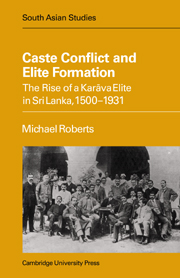Book contents
- Frontmatter
- Contents
- List of figures, chart and maps
- List of tables
- Preface
- Glossary
- List of abbreviations
- Map 1 The Kingdoms of Kotte and Kandy
- Map 2 Some physical features and place names
- Map 3 Present administrative divisions and the contemporary migration patterns of fishermen
- Map 4 The coastal waters of Sri Lanka and southeastern India
- 1 Introduction
- 2 The Karāva in the past
- 3 Caste among the Sinhalese
- 4 Economic opportunities and social relations, 1500s–1790s
- 5 The British period: the economic advances of a Karāva elite
- 6 Social competition, caste conflict and manifestations of Karāva power
- 7 Casteism in South Asian politics during British times: emergent cultural typifications or elite fictions?
- 8 Causal factors in the moulding of Karāva entrepreneurship and the emergence of a Karāva elite
- 9 Concluding remarks
- Tables
- Appendix 1 Problems and cautionary notes concerning the information derived from the plantation directories in the sequential series known as Ferguson's Ceylon Directory
- Appendix 2 A contemporary newspaper account of the reception provided for a Karāva notable on his receiving the title of ‘Mudaliyar of the Governor's Gate’ in 1853
- Appendix 3 A list of caste pamphlets and caste literature in chronological order, 1864–1930
- Select bibliography
- Index
2 - The Karāva in the past
Published online by Cambridge University Press: 30 October 2009
- Frontmatter
- Contents
- List of figures, chart and maps
- List of tables
- Preface
- Glossary
- List of abbreviations
- Map 1 The Kingdoms of Kotte and Kandy
- Map 2 Some physical features and place names
- Map 3 Present administrative divisions and the contemporary migration patterns of fishermen
- Map 4 The coastal waters of Sri Lanka and southeastern India
- 1 Introduction
- 2 The Karāva in the past
- 3 Caste among the Sinhalese
- 4 Economic opportunities and social relations, 1500s–1790s
- 5 The British period: the economic advances of a Karāva elite
- 6 Social competition, caste conflict and manifestations of Karāva power
- 7 Casteism in South Asian politics during British times: emergent cultural typifications or elite fictions?
- 8 Causal factors in the moulding of Karāva entrepreneurship and the emergence of a Karāva elite
- 9 Concluding remarks
- Tables
- Appendix 1 Problems and cautionary notes concerning the information derived from the plantation directories in the sequential series known as Ferguson's Ceylon Directory
- Appendix 2 A contemporary newspaper account of the reception provided for a Karāva notable on his receiving the title of ‘Mudaliyar of the Governor's Gate’ in 1853
- Appendix 3 A list of caste pamphlets and caste literature in chronological order, 1864–1930
- Select bibliography
- Index
Summary
Origins
According to Karāva spokesmen in recent times, the term ‘Karāva’ is derived from the Sanskrit term ‘Kaurava’ and the Karāva are of the same race of people as the Kauravar and Kurukulams of south India, the Kaorw of Rajputana and the Kurs of Bengal. They are descendants of the Kurus of the Mahabhārata and a warrior people of Kshātriya stock. Their royal lineage is said to be attested in the royal insignia in the flags and other emblems that have been used in their funeral and wedding ceremonies for several centuries, a practice sanctioned by the Sinhalese kings. The prevalence of the term ‘suriya’ in their clan names, other etymological and philological evidence and the honours they received from Sinhalese kings for military service are among the pieces of evidence presented in support of this hypothesis. This folklore is supported by several ‘sacred texts’: the Mukkara Haṭana, Edgar Thurston's volumes, the writings of Hugh Nevill and H. C. P. Bell, etc. The emphasis is on north Indian origins and Rajput warrior ancestry, though these connections are sometimes drawn in a migrant line through south India. Some versions imply that Karāva settlers even arrived with King Vijaya and with the sacred bo-tree; and the village of Moratuwa or Murathiha is said to have been settled in the time of Duttagāmani (second century b.c.) by a group of soldiers from a village of the same name in the present Kurunegala District, who were led by Prince Jayavarunakulasuriya Jayasiri Aditya of Rajputana.
- Type
- Chapter
- Information
- Caste Conflict Elite Formation , pp. 18 - 34Publisher: Cambridge University PressPrint publication year: 1982



